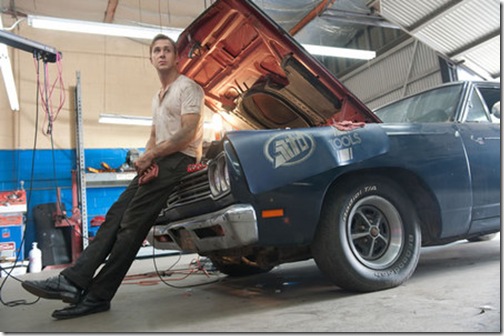It is perhaps becoming a cliché to say that the latest performance by Ryan Gosling is a revelation, because he’s already had at least two revelatory performances – in Half Nelson and Blue Valentine – in his relatively short tenure as a leading man. How many times can somebody, uh, revelate over such a brief career?
But it seems like the more we’re exposed to Gosling, the more range he shows us while remaining one of the most consistently interior actors of this or any generation. In his best roles, he plays strange, bottled-up ciphers we can never quite understand – proverbial camels waiting for that last piece of straw to burden their backs. They are the kind of people Jack Nicholson would have played 40 years ago, so it’s no surprise Gosling’s best work conjures the auteur-driven American cinema of the 1970s.
His latest character, in the brutal neo-noir Drive, is just as emotionally impenetrable and just as facially expressive as his other great roles to date – All Good Things comes to mind, too – but with an added jolt of vintage Eastwoodian laconicism. He says few words, but when he does, we listen – while shaking in our boots and clinging to our seats. This is Gosling as the 21st century anti-hero – a psychotic Dirty Harry who is only nominally nobler than the film’s cold-blooded villains – and it’s a scary embodiment.
He plays a man known simply as Driver; he lives only on the screen in front of us, we know nothing of his background or personal life, and it’s only fitting that his name is withheld, too. Driving is his life, whether crashing cars as a Hollywood stuntman by day as acting as a freelance wheelman for criminal operations at night. He’s an impersonal loner who drifts through a dangerous and sordid life; over the course of the film, he is compared overtly to a zombie and subtextually to a shark.
His routine is shaken up after he meets his neighbor Irene (the always excellent Carey Mulligan), the fetching wife of a soon-to-be-released convict and a mother of one. Avoiding any semblance of meet-cute contrivances, the two exchange some words outside their apartment, then she stops by Driver’s garage to have some auto repairs, then he sort of eventually gets around to sort of asking her on something resembling a date. Their just-the-facts conversations are filled with pregnant pauses, a welcome reprieve from the endless blather of so many Hollywood romances.
Eventually, though, Irene’s husband Standard (Oscar Isaac) is released from prison and is soon assaulted by some thugs to whom he owes protection money. When Driver involves himself in Standard’s latest heist, the plot splits open like a worm-infested cantaloupe, splintering into a barrage of surprises, double-crossings, and a level of violence that pushes the film’s R rating to its breaking point.
The star of Drive is as much as the film’s cult director, Denmark’s Nicolas Winding Refn, as it is Gosling. The man responsible for Bronson, Valhalla Rising and the Pusher series, Refn has always been a visionary stylist operating in seedy, niche genres. But this time, working from a critically acclaimed short novel by James Sallis, Refn has A-list material to flex his considerable talents.
Refn shows a deep commitment to every facet of the filmmaking process, from lighting, camera movement and mise-en-scene to the soundtrack (composer Cliff Martinez’s electronic score sets the perfect ambiance) and the direction of actors (Albert Brooks, shrewdly cast as the gangster at the top of the film’s underworld hierarchy, shows a side of himself we’ve never seen). He directs like an orchestra conductor, filming a studio thriller like the work of art every movie has the capacity to be. Both his bloody set-pieces and his benign, deliberate scenes of Driver navigating across the sprawl of Los Angeles are presented with the operatic grandeur we associate with Coppola and Scorsese’s most acclaimed work.
There are moments in this film that are as visually enrapturing as anything in Terence Malick’s canon – they pulsate with life and radiate with an uncommon glow. Drive is, quite simply, a procession of beautiful, unforgettable moments in time that add up to one of this year’s few American masterpieces.
DRIVE. Director: Nicolas Winding Refn; Cast: Ryan Gosling, Carey Mulligan, Bryan Cranston, Albert Brooks, Oscar Isaac, Ron Perlman, Christina Hendricks; Distributor: Film District; Rating: R; Opens: Friday; Venue: Most commercial houses
